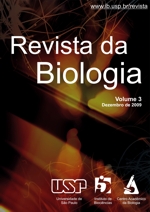Does the Darwinian theory of evolution belong only to Biologists? Implications of the biological evolution for social sciences
DOI:
https://doi.org/10.11606/issn.1984-5154.v3p1-5Keywords:
History of Biology, Humanities, Society, Interdisciplinarity.Abstract
The Darwinian theory of evolution has become the current paradigm in the biological sciences since the formulation of the synthetic theory in the 1930s and 1940s. However, the scope of the Darwinian theory has impacted areas of knowledge that go far beyond biology. The aim of this article is to make a raid on the historical relationship between evolutionary theory and social sciences. From that historical perspective, a discussion is promoted on the role of biologists in this dialogue, both in academic and social spheres.
Downloads
References
Barkow, J., Cosmides, L., e Tooby, J. (editores) (1992) The adapted mind: evolutionary psychology and the generation of culture. New York: Oxford University Press.
Buller, D. J. (2005) Adapting minds: evolutionary psychology and the persistent quest for human nature. Cambridge: MIT Press.
Darwin, C. (1859 [2004]). A origem das espécies. São Paulo: Editora Martin Claret.
- (1871 [2004]) A origem do Homem e a seleção sexual. Belo Horizonte: Editora Itatiaia.
- (1872 [2000]). A expressão das emoções no Homem e nos animais. São Paulo: companhia das letras.
- e Wallace, A. R. (1958) Evolution by natural selection, ed. por de Beer, G. Cambridge: Cambridge University Press.
Dawkins, R. (1986 [2001]). O relojoeiro cego. São Paulo: Companhia das Letras.
- (1996 [1998]) A escalada do monte improvável. São Paulo: Companhia das Letras.
- (2006 [2007]) A desilusão de Deus. Lisboa: Casa da Letras.
Dunnell, R. C. (1980). Evolutionary theory and archaeology. In: (M.B. Schiffer, Ed.) Advances in Archaeological Method and Theory vol. 3.New York, NY: Academic Press, pp. 35-99.
Eriksen, T. H., e Nielsen, F. S. (2001 [2007]) História da antropologia. Petrópolis: Editora Vozes.
Freeman, D. (1974) The evolutionary theories of Charles Darwin and Hebert Spencer. Current Anthropology 15, 211-237.
Gould, S.J. (1981 [1991]). A falsa medida do Homem. São Paulo: Martins Fontes.
- (2002). The structure of evolutionary theory. Cambridge: The Belknap Press of Harvard University Press.
Hamilton, W. D. (1964) The genetical evolution of social behaviour I and II. Journal of Theoretical Biology 7, 1- 52.
Kitcher, P. (1985) Vaulting ambition: sociobiology and the quest for human nature. Cambridge, Mass.: MIT Press.
Kroeber, A. L. (1946) History and evolution. Southwestern Journal of Anthropology 2, 1-15.
- (1956) The place of Boas in anthropology. American Anthropologist 58, 151-159.
Mayr, E. (1982 [1998]). O desenvolvimento do pensamento biológico. Brasília: Editora da Universidade de Brasília.
Meyer, D. e El-Hani, C. N. (2005) Evolução: o sentido da biologia. São Paulo: Editora Unesp.
O’Brien, M. J., editor (1996) Evolutionary archaeology: theory and application. Salt Lake City: University of Utah Press.
- (2005) Evolutionism and North America’s archaeological record. World Archaeology 37, 26-45.
Lamarck, J.-B. (1809) Philosophie zoologique, ou exposition des considérations relative à l’histoire naturelle des animaux, 2 vol. Paris: Dentu.
Lett, J. (1997) Science, reason and anthropology: the principles of rational inquiry. Oxford: Rowman & Littlefield Publishers, Inc.
Pinker, S. (1997 [1998]) Como a mente funciona. São Paulo: Companhia das Letras.
- (2002 [2004]) Tábula rasa: a negação contemporânea da natureza humana. São Paulo:
Companhia das Letras.
Ridley, M. (2003 [2006]) Evolução. 3.ed. Porto Alegre: Artmed.
Steward, J. (1955) The theory of culture change: the methodology of multilinear evolution. Urbana: University of Illinois Press.
Strauss, A. e Waizbort, R. (2008) Sob o signo de Darwin? Sobre o mau uso de uma quimera. Revista Brasileira de Ciências Sociais 23, 125-134.
Trivers, R. L. (1971) The evolution of reciprocal altruism. Quarterly Review of Biology 46, 35-57.
Warren, K. B. (1951) Origin and evolution of Man. vol. 15 of Cold Spring Harbor Symposia on Quantitative Biology.
Washburn, S. L. (1951) The new physical anthropology. Transactions of the New York Academy of Science 13 (2d ser.), 298-304.
White, L. (1959) The evolution of culture. New York: McGrawHill. Williams, G. C. (1966) Adaptation and Natural Selection. Princeton: Princeton University Press.
Wilson, E. O. (1971) The insect societies. Cambridge, Mass.: Harvard University Press.
- (1975) Sociobiology: the new synthesis. Cambridge, Mass.: Harvard University Press.
Wynne-Edwards, V. C. (1962) Animal dispersion in relation to social behaviour. New York: Hafner Publishing Company.
Downloads
Published
Issue
Section
License
Copyright (c) 2009 Pedro José Tótora da Glória

This work is licensed under a Creative Commons Attribution 4.0 International License.
We ensure that our journal does not retain any copyright and that these are exclusive of the author(s) of the text. In that sense, we intend to break any restrictions to the published material and to achieve more intensely our goal of communicating science.






